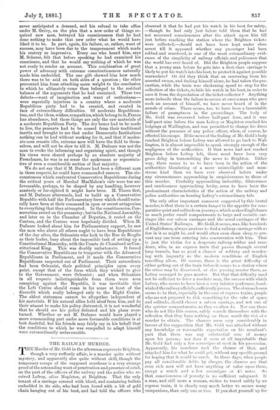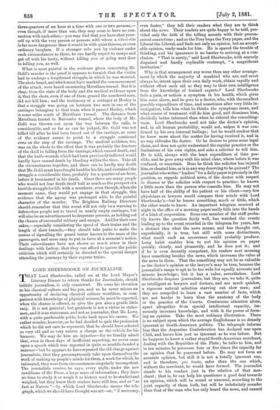THE RAILWAY MURDER.
THE Murder of Mr. Gold in the afternoon express to Brighton, though a very ruffianly affair, is a murder quite without mystery, and apparently also quite without skill, though the temporary escape of the supposed murderer is a very strange proof of the astounding want of penetration and presence of mind, on the part of the officers of the railway and the police who re- ceived Lefroy, alias Mapleton, at Brighton. That the only tenant of a carriage covered with blood, and containing bullets embedded in its side, who had been found with a bit of gold chain hanging out of his boot, and had told the officers who observed it that he had put his watch in his boot for safety, —though he had only just before told them that he had not recovered consciousness after the attack upon him till just before reaching the station where the Brighton tickets were collected,—should not have been kept under close arrest till it appeared whether any passenger had been robbed and murdered, is one of the most extraordinary evid- ences of the simplicity of railway officials and policemen that the world has ever heard of. Did the Brighton people suppose that a young man before he gets into a first-class carriage is likely to put his watch into his boot, to protect it against possible marauders P Or did. they think that on recovering from his asserted swoon, and finding himself alone, he had taken the pre- caution, while the train was slackening speed to stop for the collection of the tickets, to hide his watch in his boot, in order to save it from the depredation of the ticket-collector ? Anything more imbecile than the failure to secure at once a man who gave such an account of himself, we have never heard of in the annals of crime. There seems, too, to have been a lamentable failure of promptness in the proceedings. The body of Mr. Gold was recovered before half-past four, and it was half-past nine before the man Lefroy or Mapleton reached his lodgings at Wallington, and was permitted to change his dress without the presence of any police officer, when, of course, he effected his escape. If the news of the finding of Mr. Gold's body reached Brighton before Lefroy was allowed to go back to Wal- lington, it is almost impossible to speak strongly enough of the negligence of the authorities. If that news had not reached Brighton before Lefroy left, there must have been very gross delay in transmitting the news to Brighton. Either way, there seems to us to have been in the action of the authorities blundering of a more unintelligible and mon- strous kind than we have ever observed before under any circumstances approaching in suspiciousness to those of this murder. Credulity approaching imbecility, dilatoriness and carelessness approaching levity, seem to have been the predominant characteristics of the action of the railway and police authorities on hearing Lefroy's extraordinary tale.
The only other important comment suggested by this brutal• murder, is that there is a certain danger in the appetite for com- parative quiet and solitude on journeys, which makes Englishmen so much prefer small compartments to large and sociable car- riages like our saloon carriages and the usual carriages of the United States' Railways. Mr. Gold, it seems, was, like hundreds of Englishmen, always anxious to find a railway-carriage with as few in it as might be, and would often even sham sleep, to pre- vent any one from entering into conversation with him. That is just the victim for a desperate railway robber and mur- derer, who, in an express train that passes through several long tunnels, has as good a chance of robbery and murder- ing with impunity as the modern conditions of English travelling allow. Of course, there is the great difficulty of either getting out of the train before it comes to a station where the crime may be discovered, or else passing muster there, as Lefroy managed to pass muster. But that that difficulty need not be sufficient to deter a resolute man, the success with which Lefroy, who seems to have been a very inferior performer, hood- winked the railway officials, sufficiently proves. The obvious lesson seems to be that, especially in the case of express trains, people who are not prepared to risk something for the sake of space and solitude, should choose a saloon carriage, and not one of the quieter compartments, as they so often do. Nor can those who do not like this course, safely console themselves with the reflection that they have nothing on them worth the risk of a murder to obtain. The chances seem very considerably in favour of the supposition that Mr. Gold was attacked without any knowledge or reasonable expectation on his assailant's part that there was any substantial sum of money upon his person ; nor does it seem at all improbable that Mr. Gold had only a few sovereigns at most in his possession. Apparently, his murderer took the chance of that, and attacked him for what he could get, without any specific ground for hoping that it would be much. In these days, when people pay all considerable debts by cheque, the chances are that even rich men will not have anything of value upon them, except a watch and a few sovereigns or £5 notes. So that consciousness of poverty is no sufficient safeguard. If a man, and still more a woman, wishes to travel safely by an express train, it is clearly very much better to secure many companions, than only one or two. If you shut yourself up for three-quarters of an hour at a time with one or two persons,— even though, if more than one, they may seem to have no con- nection with each other,—you may find that you have shut your- self up with the very person or persons with whom a tete-a-tete is far more dangerous than it would be with quiet thieves, or even ordinary burglars. If a stranger robs you by violence under such circumstances as these, he can hardly expect to escape and get off with his booty, without killing you or going next door to killing you, as well.
What is most painful in the evidence given concerning Mr. Gold's murder is the proof it appears to furnish that the victim had to undergo a lengthened struggle, in which he was worsted. The shots heard, and which must have marked the commencement of the attack, were heard on entering Merstham tunnel. But it is clear, from the state of the body and the medical evidence upon it that the shots, even if one of them grazed the murdered man, did not kill him ; and the testimony of a cottager at Horley is that a struggle was going on between two men in one of the carriages belonging to that train when it passed Horley, which is some miles south of Merstham tunnel. The distance from Merstham tunnel to Balcombe tunnel, where the body of Mr. Gold was thrown out upon the way between the rails, is considerable, and so far as can be judged, Mr. Gold' was not killed till after he had been forced out of the carriage, as some of the evidence seems to point to a struggle continued eyed on the step of the carriage. The medical evidence, too, was on the whole to the effect that it was probably the fracture of the skull in falling from the carriage, which caused death, and that the knife-wounds which had been previously inflicted would hardly have caused death by bleeding within the time. Take all the circumstances together, and there can be hardly any doubt that Mr. Gold must have fought hard for his life, and sustained the struggle a considerable time, probably for a quarter-of-an-hour, before it terminated in his death; Since there are many people who would not fear death itself half as much as the prospect of a terrible struggle for life with a murderer, even though, when the moment came, they would yet engage in that struggle, this evidence that the agony was prolonged adds to the painful character of the murder. The Brighton Railway Directors should_remember that this event will not only be a warning to defenceless people not to travel in nearly empty carriages, but will also be an advertisement to desperate persons, as holding out the chance of successful robbery and escape. And for their own sakes,—especially considering the speed of their trains and the length of their tunnels,—they should take pains to make the means of signalling the guard better known to the mass of the passengers, and more easy to put in force at a moment's notice. Their subordinates have not shown so much sense in their dealings with Lefroy, that they can afford to ignore the public criticism which will certainly be directed to the special danger attending the journeys by their express trains.



































 Previous page
Previous page